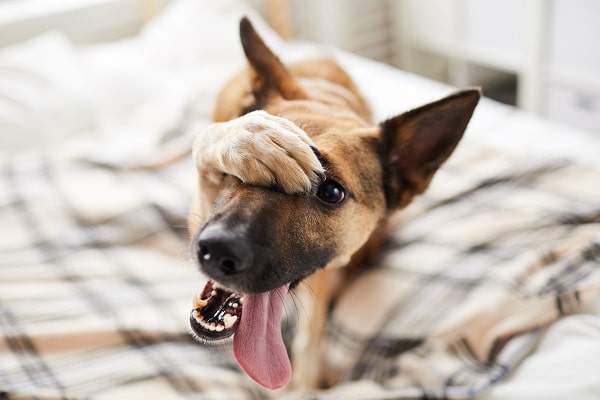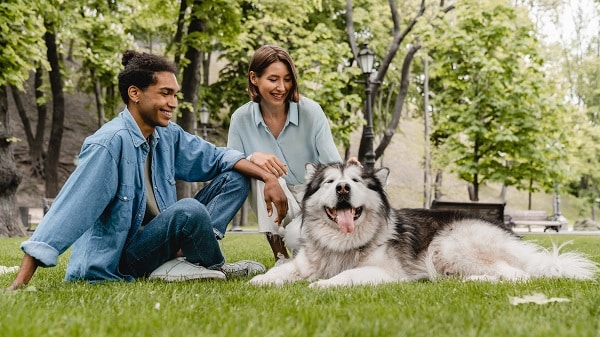If you are a pet owner, it is likely that your dog has experienced some level of nervousness or anxiety at some point. Whether it be due to loud noises and commotions, an unfamiliar environment or strange people, anxious behavior in your pups can make you feel helpless. However, the good news is there are numerous methods you can implement to help manage and reduce this type of behavior in your canine companions. This post will cover effective ways to reduce nervousness in dogs so that they live happier and healthier lives. Keep reading for more information!
Contents
- 1 Identifying the Cause of Nervousness in Dogs
- 2 Solutions for Reducing Nervousness in Dogs
- 3 Creating a Safe and Comfortable Environment
- 4 Training And Socialization
- 5 Exercise And Mental Stimulation
- 6 Medications and Supplements
- 7 Prevention Of Nervousness In Dogs
- 8 Try These Effective Ways To Reduce Nervousness In Your Dog!
Identifying the Cause of Nervousness in Dogs

Nervousness in dogs can be caused by several factors. Identifying the root cause of your dog’s anxiety is important before you can address it. Some common causes of nervousness in dogs include:
- Loud Noises – Loud noises like thunderstorms, fireworks, or construction sounds can cause anxiety in dogs. Dogs have more sensitive hearing than humans, and loud noises can overwhelm them.
- Separation Anxiety – Some dogs may experience separation anxiety when their owners leave them alone. They may become destructive, bark excessively, or try to escape.
- Fear of Other Animals or People – Dogs may also become nervous around other animals or people, especially if they’ve had a negative experience in the past.
- Medical Conditions – Certain medical conditions like thyroid problems or epilepsy can cause anxiety in dogs.
- Lack of Exercise or Stimulation – Dogs need regular exercise and mental stimulation to stay happy and healthy. Without enough exercise or mental stimulation, dogs may become bored and anxious.
Solutions for Reducing Nervousness in Dogs
Once you’ve identified the root cause of your dog’s nervousness, there are several effective ways to help them reduce their anxiety levels.
Creating a Safe and Comfortable Environment

As a dog owner, you can create a safe and comfortable environment for your dog by providing them with a safe space and using calming scents and sounds.
- Provide a Safe Space for Your Dog – Providing a safe space for your dog can help them feel more secure and calm. You can create a cozy den-like space for your dog by using a crate or a soft bed in a quiet corner of your home. This will give your dog a space to retreat when anxious or overwhelmed.
- Use Calming Scents and Sounds – Calming scents and sounds can help your dog relax and reduce anxiety. You can use lavender or chamomile scents to calm your dog and play calming music or white noise to help them feel more relaxed.
Training And Socialization

Training and socialization are important for dogs to learn how to interact with people and other animals. Training and socialization can help reduce your dog’s anxiety levels by increasing their confidence and teaching them how to behave in different situations.
- Obedience Training – Obedience training is important for all dogs but especially for anxious dogs. Obedience training can help your dog learn basic commands like sit, stay, and come, increasing their confidence and reducing their anxiety levels.
- Socializing With Other Animals and People – Socializing your dog with other animals and people can help reduce their anxiety levels by teaching them how to behave in different situations. You can start by introducing your dog to other dogs or people in a controlled environment and gradually increase the level of exposure as your dog becomes more comfortable.
Exercise And Mental Stimulation

Regular exercise and mental stimulation are essential for keeping your dog happy and healthy. Exercise and mental stimulation can help reduce your dog’s anxiety levels by providing an outlet for their energy and helping them stay mentally stimulated.
- Regular Exercise and Playtime – Regular exercise and playtime are important for dogs to burn off excess energy and stay physically healthy. Exercise can also help reduce anxiety in dogs by releasing endorphins, natural chemicals in the brain that can improve mood and reduce stress. The amount and type of exercise your dog needs depends on age, breed, and health condition. Some dogs may need more exercise than others, and some may enjoy different types of exercise, such as playing fetch, going for a walk, or swimming.
- Puzzle Toys and Games – Mental stimulation is as important as physical exercise for dogs. Puzzle toys and games can help keep your dog mentally stimulated and prevent boredom. You can find puzzle toys that require your dog to solve a problem, such as getting a treat from a toy, or playing hide-and-seek games with your dog.
Medications and Supplements

- Consultation with a Veterinarian – If your dog’s anxiety levels are severe or other methods have not been effective, you should consult your veterinarian. Your veterinarian can help identify the root cause of your dog’s anxiety and recommend appropriate treatment options.
- Prescription Medications or Natural Supplements – Depending on the severity of your dog’s anxiety, your veterinarian may recommend prescription medications or natural supplements to help reduce their anxiety levels. Prescription medications, such as anti-anxiety drugs or sedatives, can help calm your dog and reduce anxiety. Natural supplements, such as CBD oil or chamomile, can also help reduce your dog’s anxiety levels.
Prevention Of Nervousness In Dogs

Preventing nervousness in dogs is just as important as reducing their anxiety levels. By following these preventative measures, you can help ensure that your dog stays happy and healthy.
- Early Training and Socialization – Early training and socialization are essential for preventing nervousness in dogs. You should start training and socializing your dog at a young age to teach them how to behave in different situations and increase their confidence.
- Regular Veterinary Check-Ups – Regular veterinary check-ups can help identify any underlying medical conditions that may be causing your dog’s anxiety. Your veterinarian can also recommend appropriate treatment options and preventative measures.
- Consistent Exercise and Mental Stimulation -As mentioned above, regular exercise and mental stimulation can help reduce anxiety in dogs and keep them mentally in check.
- Consistent Routines and Boundaries – Dogs thrive on routine and boundaries. Consistent routines and boundaries can help prevent nervousness in dogs by giving them a sense of security and predictability.
Try These Effective Ways To Reduce Nervousness In Your Dog!
If your dog is experiencing feelings of nervousness, there are effective and safe ways to help reduce their anxiety levels. Everything from regular exercise and mental stimulation to early training and socialization can help reduce your dog’s anxiety. You should also consider consulting a veterinarian if other methods are ineffective. By following these tips, you can help ensure your dog is happy and healthy!


